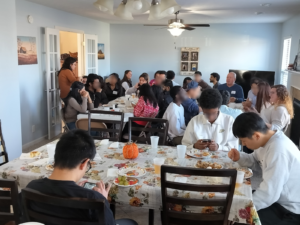When we suffer, we are prone to doubt either that God exists or that God loves us.
We need to understand that doubts are not uncommon for disciples of Jesus. This is abundantly clear from reading the Bible. The people of Israel—with Moses leading them—doubted even after they had seen the plagues and the Red Sea parted.
The book of Exodus shows us that miracles are no guarantee of faith—or of assurance. If they were a guarantee of faith, Pharaoh would have believed and turned to God. If miracles alone could provide us assurance, Israel would not have doubted God.
After Elijah had defeated 450 prophets of Baal and seen fire fall from heaven, he fled from Jezebel and had a pity party (1 Kings 19).
Jesus said that among those born of women none was greater than John the Baptist. Yet when he was in prison, John doubted.
Doubts are not uncommon. It’s okay to doubt.
Doubt is not the opposite of faith. Unbelief is the opposite of faith.
Henry Drummond put it this way:
“Doubt is can’t believe; unbelief is won’t believe. Doubt is honesty; unbelief is obstinacy. Doubt is looking for light; unbelief is content with darkness.”
Nothing’s wrong with you if you doubt! Nothing’s wrong with God or the Gospel if you doubt!
After his wife’s death CS Lewis wrote a little book named A Grief Observed. It’s raw. Early in the book Lewis wrote this:
Not that I am (I think) in much danger of ceasing to believe in God. The real danger is of coming to believe such dreadful things about him. The conclusion I dread is not “‘so there’s no God after all,’ but ‘so this is what God’s really like. Deceive yourself no longer.’”
Lewis wasn’t doubting if God existed, he was asking if God cared.
Some have thought that Lewis lost his faith after his wife’s death. Not so! Reading to the end of A Grief Observed shows that he kept his faith.
When I lay these questions before God I get no answer. But a rather special sort of ‘no answer.’ It is not the locked door. It is more like a silent, certainly not uncompassionate, gaze. As though he shook his head not in refusal but waiving the question. Like, ‘peace, child; you don’t understand.’ Can a mortal ask questions which God finds unanswerable? Quite easily, I should think. All nonsense questions are unanswerable. How many hours are there in a mile? Is yellow square or round? Probably half the questions we ask—half our great theological and metaphysical problems—are like that. And now that I come to think of it, there’s no practical problem before me at all. I know the two great commandments, and I’d better get on with them.1
Lewis gives us some good advice. Sometimes we just have to press on despite our emotions. Sometimes, given the evidence we have, we have to be satisfied knowing that two things are true that we can’t fully reconcile to each other. For instance, physicists tell us that both relativity and quantum mechanics are extremely well-tested theories. They also tell us that they can’t perfectly reconcile them. But they don’t conclude that one or the other is false. Why? Because both scientific theories have evidentially been confirmed over and over. Physicists hope—eventually—to understand how they work together. But in the meantime, there is a tension.
The evidence of evil and suffering is evident. What evidence do we have that God loves us? The answer to that question is simple—but it’s not easy. The answer is the cross.
Lewis admittedly didn’t have all the answers to the problem of pain. I don’t think anyone other than God has all the answers when it comes to suffering. But we don’t need all the answers. We need to know who to turn to when we suffer.
Not only does the Bible show clearly that the faithful sometimes doubt, it also reveals that they also sometimes suffer. So, disciples of Jesus shouldn’t be surprised if they suffer.
Job, Jeremiah, and Jesus are biblical examples that come to mind. The Bible is filled with laments. Lament is crying out to God from an experience of pain. Frequently, lament is complaining to God about seeming injustice.
Job 3:11 says: “Why did I not perish at birth, come forth from the womb and expire?”
In Jeremiah 15:18 we read: Why is my pain unending and my wound grievous and incurable?
Even Jesus felt abandoned. In Matthew 27:46 he cries out to his Father, “My God, my God, why have you forsaken me?”
In the biblical story, there are five acts.
Act 1: The world before the fall.
Act 2: The world after the fall but before Jesus Christ.
Act 3: The ministry of Jesus—including his death, resurrection, and ascension.
Act 4: The world with the Gospel and the Spirit—set right in an already but not yet fully realized sense.
Act 5: The world to come, new heavens and new earth.
Presently, we’re in Act 4!
The question is this: Are evil and suffering and doubt unexpected things according to Scripture?
The answer is no; in fact, they are exactly what the Bible leads us to expect.
But if evil, suffering, and doubt are not surprising, how exactly do they work against the Christian worldview?
The answer seems obvious: They don’t!
Let me conclude by saying this: If you are suffering, turn to Jesus, who is a man of sorrows acquainted with grief (Isaiah 53:3). If you are doubting, go to Jesus and tell him so. He will not judge you; in fact, he will welcome you, show you his nail-scarred hands, and strengthen your faith.
Bob Stewart is a Professor Emeritus of New Orleans Baptist Theological Seminary.
- C. S. Lewis, A Grief Observed, 69-70. ↩︎






